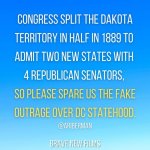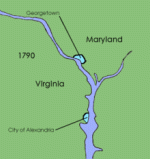lpetrich
Contributor
D.C. statehood hits a snag in the Senate - POLITICO
Four Senate Democrats are not on board with DC statehood:
Four Senate Democrats are not on board with DC statehood:
Sen. Kyrsten Sinema (D-AZ) has not stated anything on this issue.1-Sen. Jeanne Shaheen (D-N.H.), who co-sponsored D.C. statehood legislation the last go around: "I supported D.C. statehood so I haven't really studied this bill enough to know whether I'm going to sponsor it or not."
2-Sen. Angus King (I-Maine): "I'm not signed on yet. I'm still sort of pondering it. There are just other issues that I'm more engaged in at this point. I haven't really dug into it."
3-Sen. Joe Manchin (D-W.V.): "We're just still discussing it. I haven't really gotten into any of that -- I have so much other stuff going on."
4-Sen. Mark Kelly (D-Ariz.): "Like a lot of things like this, I want to see the details. This is pretty straightforward, but in general I feel that every American has a right to representation in the United States Congress. And there are a lot of folks that live here in D.C. There are a lot of options to do that ... I think our democracy is best served when folks have representation in the United States Congress."


